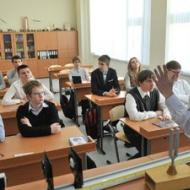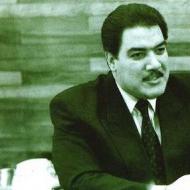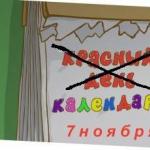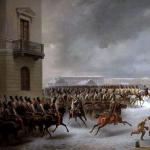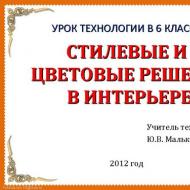
Современное образование на английском языке. Education, устная тема по английскому языку с переводом. Топик. Рассказ про образование на английском
Education
Education
plays an important role in our life. However, some people
consider it only a necessary step in getting a job so they do
not want to go to university after leaving school.
"Knowledge is power" as the famous proverb says. It is
transferred from generation to generation and comprises
different facts, skills and information. Through learning people
get knowledge and experience accumulated by their ancestors.
Of course, higher education is not compulsory, but I strongly
feel that going to university is very important to everybody. In
my opinion, higher education gives great opportunities and opens
all doors. Only an educated person can get a good job and be
promoted. Nowadays employers demand perfect knowledge. Education
helps cultivate skills and provides mental, moral and aesthetic
development. Personally, I prefer communicating with an
intelligent person who knows a lot of interesting facts and who
can share his or her ideas with me.
However, some of my friends say that they do not want to go to
university and they would better get a well-paid job soon after
leaving school. It will give them an opportunity to get work
experience and some useful skills. But I doubt that they will be
offered a really good job and that they will be able to succeed
without higher education.
In general, owing to education highly industrialized cities are
built, new information technologies are developed, important
discoveries are made. Without education society would become
primitive as it used to be long time ago. To my mind, everybody
must realize the importance of education as it is the guarantee
of the development and well-being of our society.
Home education
is becoming more and more popular. However, some people say it
has a number of disadvantages.
Most parents send their sons and daughters to school, but
some of them choose home education for their children for some
reason or other. Instead of going to school children are
educated by their parents or professional tutors. Thousands of
families in the UK are now practising home-education.
Personally, I think that home schooling is an excellent
alternative to traditional education. To my mind, it has a lot
of advantages. Firstly, it is very convenient because you do not
need to observe school hours, days or terms. Besides, you do not
need to have a fixed timetable. Parents can provide a more
personalized and adaptable learning environment for the child.
Secondly, the family can spend more time together. Thirdly,
children who have special educational needs are home educated
when school cannot meet the child"s needs. In general, home
schooling gives you an opportunity to work on just what you want
and when you want.
However, a lot of people are sure that the aim of any
educational establishment is not just to give knowledge but to
help their learners develop communication skills and team
spirit. Children"s interaction with pupils of their age
influences their character building. School is not only a place
for the imparting of knowledge, but it"s a place for the
creation and development of the child"s personality.
To conclude, home schooling has its pros and cons and it"s up to
the child"s parents to decide which kind of education is better
for him or her. Anyway, parents must provide their children with
full-time education suitable to their age, ability and aptitude.
Some people
say that online education is an excellent alternative to
traditional education. But other people believe that virtual
education cannot substitute traditional one.
Online education is rapidly increasing thanks to the
development of computer technology. It is intended for those who
can"t attend classes and communicate with the teacher face to
face. Education is delivered via the Internet, multimedia
resources or videoconferencing. Teachers and students
communicate by exchanging electronic media or in real time.
Personally, I think that online education is especially
convenient for disabled people and for those who want to work
and receive higher education simultaneously. You don"t have to
attend classes and you can plan your day as you want. In my
opinion, receiving education online may be rather interesting.
Some universities offer online student support services, such as
online advising and registration, e-counseling, online textbook
purchase, student governments and even student newspapers.
However, a lot of people think that online learning is not as
effective as traditional education. Firstly, students don"t have
an opportunity to communicate with their teachers and
group-mates face to face. If they want to ask a question or to
receive some additional information, they have to send an e-mail
and wait for the teacher"s answer. Secondly, it is rather
difficult for teachers to control students" knowledge, to
evaluate their progress, to appreciate their abilities and to
find an individual approach to everybody.
To conclude, I think that online learning is a wonderful
opportunity to receive higher education for some people,
although computer-based activities will hardly be able to
replace practical or classroom-based situations.
Some people
think that self-education is not very effective, while others
say that it is the only productive way of learning.
Is it possible for people to educate themselves without help
or support from others? Can self-taught people become famous and
successful?
In my opinion, people can learn without schools and tutors. You
can read books, speak to educated people or spend a lot of time
in libraries or on educational websites. Self-education has a
lot of advantages. Firstly, self-taught people are not dependent
on others for knowledge. Secondly, self-education can help you
to be anything you want to be or to do anything you want to do.
Finally, it usually costs nothing and it does not require fixed
life style. Many famous and influential writers, artists,
architects, actors, musicians and even scientists were
self-educated. They thought that working was also learning and
self-education was associated with creativity. For example,
Leonardo da Vinci, an Italian painter, sculptor, architect,
musician, scientist, mathematician, engineer, inventor and
writer was self-taught.
However, some people depend on teachers and tutors for guidance.
They want someone to help them and to show them the way. Others
admit that they are too lazy to choose self-education. Indeed,
most people need somebody who will constantly make them study
and encourage their efforts to learn. So I think that
self-education is only for hard-working, persistent, diligent
and curious people.
In conclusion, I would like to say that if we learn the art of
self-education, we will have an opportunity to improve our
knowledge and acquire new skills whenever and wherever we like.
I believe that the options of self-education are very flexible
and the opportunities are unlimited.
Some people
think that when they don"t go to school, college or university,
they don"t learn. Others say that we learn as long as we live.
Today a lot of people realize the importance of lifelong
learning. In the course of our lives we acquire attitudes,
skills and knowledge from daily experience, from family and
neighbours, from work and play and from other sources. Lifelong
learning means building, development and improvement of skills
and knowledge throughout people"s lives and it comprises both
formal and informal learning opportunities.
To my mind, when people leave school or graduate from
university, their learning continues. It takes place at all
times and in all places. Lifelong learning is a continuous
process, going on from birth to the end of our lives. It begins
with learning from families, educational institutions,
workplaces and so on. Social organizations, religious
institutions, the mass media, information technologies,
environment and nature can also play a role in our learning. I
strongly feel that both children and adults need continuous
development of intellect and capability. Even elderly people
never cease to learn. They can learn a great deal from such
activities as art, music, handicrafts or social work. Lifelong
learning helps people adapt to the modern life which is
constantly changing.
However, there are many unintelligent and ignorant people in the
world. Most of them lack willingness and motivation to learn.
Some people are not ready to invest time, money and effort in
their education or training. Lifelong learning must be
self-motivated because people usually take responsibility for
their own learning.
To conclude, I think that lifelong learning is extremely
beneficial because it helps adapt to changes, develop natural
abilities and open the mind. It increases our wisdom and makes
our lives more interesting and meaningful.
Some people
believe that exams are the best way to check the student"s
knowledge. Others are convinced that exams don"t always
accurately measure the level of knowledge.
Most people have to get through exams at certain points of
their lives. But what is the real purpose of taking exams? How
important are they and do students benefit from them?
I strongly feel that examinations are extremely useful because
they make all students face an intellectual challenge and test
their knowledge, skills and abilities. Exams encourage young
people to improve their knowledge of the subject and to revise
information which has been learnt over a period of time.
Students always know that they are to take exams at the end of
the term and learn the new material little by little so that
they won"t have to cram later.
On the other hand, young people who often miss classes sometimes
receive passing grades as easily as those who have attended
classes regularly. When such students perform well on exams, it
is obvious that they have crammed or figured out a way to cheat.
Besides, while for some people taking exams is no big deal, most
of us feel stressed. If a student looks confused and worried and
can"t answer the teacher"s question, it may be the result of his
or her nervousness. Unfortunately, exams cannot determine stress
factors and tell honest students from cheaters. But of course it
does not mean that exams must be abolished. Though exams are not
always the best method of evaluating the student"s knowledge,
they have a lot of advantages and help teachers understand
whether students are ready to be promoted to the next level.
To sum up, I think that examinations are important because they
are a step toward students" future success.
Many people
think that homework is essential for every pupil. Others believe
that it is of little educational value and it may have a
negative effect on learning.
Some people think that homework is rote work which takes up
children"s time, without offering any benefit. But others say
that though boring, homework is going to benefit pupils later in
life.
Personally, I think that homework plays an important role in the
pupil"s education. Firstly, it teaches children to be
responsible and hard-working because it fosters independent
learning. Secondly, homework helps reinforce what pupils have
already learnt, prepare them for upcoming lessons and extend
what they know. So homework assignments make children learn more
and revise the material that they have learnt at school.
Thirdly, homework provides an opportunity for parents to
participate in their children"s education.
However, too much homework is not good as children also need
some time to relax, exercise and play. Homework takes a lot of
time and effort. Some pupils sit up and do their homework all
night. It is a well-known fact that lack of physical exercises
and good sleep leads to stress, heart attacks and obesity. What
is more, some pupils do not have good dictionaries,
encyclopedias, computers with a good internet connection and
parents who can help them. As a result, children have great
difficulty in doing their homework and begin to hate it. But I
believe that if pupils were not given homework, they would spend
their free time having fun or even doing something illegal.
To sum up, teachers need to know what their pupils understand
and can do independently. Therefore, they give pupils homework
assignments. I am convinced that homework gives you an
opportunity to increase your knowledge, to improve your
abilities and skills and to grasp new concepts.
Most people
think that it is very important to be literate. However, some of
them say that literacy is not essential.
The 21st century is the age of information and technological
advances. However, millions of people all over the world remain
illiterate. Even in developed countries a lot of people have low
literacy levels.
We live in a society where most people are literate. That is why
a person will feel ashamed and ill at ease if he or she can"t
read or write as well as others do. As a rule such a person is
considered unintelligent and ill-bred. To my mind, people who
make a lot of spelling and grammar mistakes and who can"t
pronounce words correctly find it difficult to find jobs, even
when reading and writing are not necessary for the work. What is
more, statistics show that illiterate people are poorer and have
worse health.
But in some families children don"t have an opportunity to go to
school for different reasons. Such situation is wide-spread in
Third World countries. In some families parents don"t read books
and never write letters or postcards. Reading and writing don"t
play a big part in their lives. Such people make a lot of
mistakes when they speak, but it does not necessarily mean that
they are stupid or ignorant. They can be good workers and they
can have much experience and worldly wisdom.
To conclude, I think that literacy is very important for
everybody. It helps us communicate with other people and find a
good job. However, the ability to read and write doesn"t make
people happy.
Some people
are convinced that holidays, traditions and rituals play a very
important role in education. Others don"t find it necessary to
observe traditions at school.
Traditions, holidays and rituals link the present with the
past, help pass the knowledge, experience, wisdom, skills,
habits and practices of the older generations to the new ones.
So it seems necessary to make them part and parcel of the
process of studies.
I strongly feel that children, teenagers and young people should
know and observe the traditions of their country. Holidays,
traditions and rituals help pupils learn more about the history
and culture of their country. Celebrating national and local
holidays makes young people united and has a great impact on
their character-shaping. To my mind, children should also know
the origins of some holidays and the way they are celebrated in
other countries.
However, some people are convinced that while at school pupils
should concentrate on such subjects as mathematics, physics,
chemistry or foreign languages. Most parents don"t find it
necessary to overburden children with additional information
when they have so much homework to do. Besides, they don"t
understand how schools can integrate traditions, holidays and
rituals into the curriculum. But I think there are many
interesting ways to do it. For example, teachers can prepare
lessons devoted to some public holidays or local occasions such
as celebrations of birthday anniversaries.
To conclude, our future depends on the younger generation and
adults must teach them to preserve the holidays, customs,
ceremonies, traditions and rituals that have become part and
parcel of our existence. We should adopt other people"s
experience and wisdom. And it is well-known that holidays,
traditions and rituals hold them in full measure.
Some people
think that creativity is an essential ability which must be
taught at school. Others say that creativity is not very
important.
Teaching creativity is becoming a topical issue nowadays.
But many people still doubt if this ability is essential for
modern life.
To my mind, teaching creativity is extremely important because
school leavers and university graduates face a lot of challenges
in real life. Nowadays employers demand not only perfect
knowledge and work experience, but different qualities including
creativity. If you want to become a good specialist, you should
be able to produce new and original ideas and to use your
imagination and inventiveness. Creative people do their work
faster and without much difficulty, while a person who lacks
creativity does it under pressure, forcing his or her brain. So
creative individuals are more likely to succeed, that it why
teachers should focus on creativity rather than conventional
skills.
On the other hand, creativity is not always encouraged at
school. When pupils are given different tasks, they are often
supposed to do them following examples and the teacher"s
directions. There is too much control at school and too little
freedom. Besides, many tasks are not interesting and they don"t
teach students to solve problems and to make decisions. If
teachers want to develop pupils" creativity, they should let
them make mistakes, experiment, express their ideas and look for
unusual ways of problem-solving. Children should be taught to be
original. They should also be taught to think, to make
suggestions and to rely on personal judgment rather than actual
facts.
To sum up, creativity is an engine of success. In my opinion,
both pupils and teachers must work hard to develop children"s
creativity because it will help them realize the full extent of
their own gifts.
Some people
say that punishment should be used in class to achieve
discipline and to make pupils study hard. Others are convinced
that punishment does not motivate pupils to study well.
There is still a lot of argument if punishment must be used
in schools. Traditionally pupils are punished for poor progress,
cutting lessons, lying, untidiness or rudeness. But some parents
think that schools have very strict rules and that teachers
sometimes demand too much.
Personally, I think that if pupils don"t work hard enough and
behave inappropriately, they should be punished. For example, if
the pupil receives bad marks, the teacher can phone his or her
parents and tell them about their child"s poor progress. As a
rule, Moms and Dads know how to punish their son or daughter.
Parents can forbid their children to watch TV, play computer
games or leave the house during the free time in the evenings.
To my mind, it is useful to give pupils some extra work such as
writing an exercise or an essay, copying out a paragraph from a
textbook, learning a poem by heart and so on. It will help
pupils improve their knowledge and it will certainly teach them
a lesson.
However, some people believe that any kind of punishment
humiliates pupils and makes them fear and suffer a shame. Such
people say that it is better to use awards to motivate boys and
girls to study hard and to behave well. According to them, good
marks or praise show pupils how much their work is appreciated
and valued. But to my mind, teachers should use both punishment
and awards.
To conclude, there are plenty of ways for teachers to control
academic progress and to discourage pupils from breaking school
rules. Anyway, I strongly feel that strict systems usually work
well.
Из учебного пособия
Education plays a very important role in our life. It is one of the most valuable possessions a man can get in his life.
During all the periods of human history education ranked high among people. Human progress mostly depended upon well-educated people. We get our knowledge of this world and life through education. Many famous discoveries would have been impossible if people were not interested in learning something. Self-education is very important for the development of human’s talents. Only through self-education a person can become a harmonically developed personality.
A person becomes a highly qualified specialist after getting some special education. And professionalism can be reached only through it. Even highly qualified specialists from time to time attend refresher courses to refresh their knowledge.
Education develops all sides of human personality, reveals his abilities. Besides, it helps a person to understand himself, to choose the right way in this world. The civilized state differs from others in the fact that it pays much attention to the educational policy. John Kennedy said: “Our progress as a nation can be no swifter than our progress in education”. But it doesn’t concern only one particular nation. We know that science and art belong to the whole world. Before them the barriers of nationality disappear. So education brings people closer to each other, helps them to understand each other better.
Образование в нашей жизни
Образование играет очень важную роль в нашей жизни. Это одна из самых ценных вещей, которую человек может получить в своей жизни.
В течение всех периодов человеческой истории образование имело высокий рейтинг среди населения. Человеческий прогресс в основном зависит от хорошо образованных людей. Мы получаем наши знания о мире и жизни посредством образования. Многие известные открытия были бы невозможны, если бы люди не были заинтересованы научиться чему-то. Самообразование имеет большое значение для развития человеческих талантов. Только путем самообразования человек может стать гармонично развитой личностью.
Человек становится высококвалифицированным специалистом после получения специального образования. А профессионализм может быть достигнут только через него. Даже высококвалифицированные специалисты время от времени посещают курсы повышения квалификации для обновления своих знаний.
Образование развивает все стороны человеческой личности, раскрывает все способности. Кроме того, оно помогает человеку понять самого себя, чтобы выбрать правильный путь в этом мире. Цивилизованное государство отличается от других тем, что оно уделяет большое внимание образовательной политике. Джон Кеннеди сказал: "Наш прогресс как нации не может быть быстрее, чем наш прогресс в образовании". Но это касается не только одной конкретной нации. Мы знаем, что наука и искусство принадлежит всему миру. Перед ними барьеры национальностей исчезают. Образование объединяет людей, помогает им лучше понимать друг друга.
В этой подборке представлены основные английские слова на тему “Образование”. Здесь вы не найдете перечня школьных предметов и подробного списка школьной лексики – только около 30 основных существительных. Более подробно с лексикой на тему образования вы можете ознакомиться в статье: . Также рекомендую посмотреть подборку , а если вас интересуют точные науки, то отдельные статьи по и терминам.
| study | [ˈstʌdi] | изучение, исследование |
| school | школа | |
| college | [ˈkɒlɪʤ] | колледж |
| university | [ˌjuːnɪˈvɜːsɪti] | университет |
| education | [ˌɛdju(ː)ˈkeɪʃən] | образование |
| degree | ученая степень | |
| graduate | [ˈgrædjʊət] | выпускник |
| diploma | диплом | |
| textbook | [ˈtɛkstbʊk] | учебник |
| notebook | [ˈnəʊtbʊk] | тетрадь |
| notepad | [ˈnəʊtˌpæd] | блокнот |
| pen | авторучка | |
| pencil | [ˈpɛnsl] | карандаш |
| blackboard | [ˈblækbɔːd] | школьная доска |
| whiteboard | [ˈwaɪtbɔːd] | маркерная доска |
| classroom | [ˈklɑːsrʊm] | класс (помещение) |
| class, lesson | , [ˈlɛsn] | урок |
| grade | класс (этап обучения) | |
| mark, grade | , | оценка |
| pupil | [ˈpjuːpl] | ученик |
| student | [ˈstjuːdənt] | студент |
| teacher | [ˈtiːʧə] | учитель |
| exam (examination) | [ɪgˈzæm] [ɪgˌzæmɪˈneɪʃən] | экзамен |
| test | тест |
Примеры:
В примерах приведены не все возможные значения слов, а только одно-два основных, относящихся к данной части речи и теме. Если вы хотите узнать больше значений и примеров, воспользуйтесь онлайн-словарями и переводчиками.
- study – изучение, исследование
What is the main idea of your study? – Какова основная идея вашего исследования?
- school – школа
Why are you not at school? It’s a school day, isn’t it? – Почему ты не в школе? Сегодня ведь учебный день, не так ли?
- college – колледж
I graduated from the college in twenty-sixteen. – Я закончил колледж в 2016 году.
- university – университет
She is a student of Loyola university. – Она студентка университета Лойола.
- education – образование
Education is your key to success. – Образование – это твой ключ к успеху.
- degree – ученая степень
I have a bachelor’s degree. – У меня степень бакалавра.
- graduate – выпускник
She’s a Yale graduate. – Она выпускница Йельского университета.
- diploma – диплом
He has a high school diploma. – У него диплом выпускника средней школы.
- textbook – учебник
The student took a textbook from the library. – Студент взял учебник в библиотеке.
- notebook, copybook – тетрадь
I have lost my notebook with important notes. – Я потерял тетрадь с важными записями.
- notepad – блокнот
He took a notepad and wrote down the license plate numbers. – Он взял блокнот и записал номера машин.
- pen – авторучка
Can I lend your pen for a second? – Могу я одолжить вашу ручку на секунду?
- pencil – карандаш
Artists use pencils for shading. – Художники используют карандаши для нанесения теней.
- blackboard – школьная доска
Write in on the blackboard. – Напишите это на доске.
- whiteboard – маркерная доска
She drew a picture on the whiteboard. – Она нарисовала картинку на (белой маркерной) доске.
- classroom – класс (помещение)
You can’t use your mobile phones in the classroom. – Нельзя пользоваться мобильными телефонами в классе.
- class, l esson – урок
Sorry, I don’t have time, I have to go to the next class. – Извините, у меня нет времени, мне нужно идти на следующий урок.
- grade – класс (этап обучения)
Tommy is in the fourth grade. – Томми учится в четвертом классе.
- mark , grade – оценка
What mark did you get in the exam? – Какую оценку ты получил на экзамене?
- pupil – ученик
Some teachers remember all their pupils. – Некоторые учителя помнят всех своих учеников.
- student – студент
The student has been expelled from the college. – Студента отчислили из колледжа.
- teacher – учитель
My math teacher told me I could make a good teacher. – Мой учитель математики говорил мне, что из меня мог бы выйти хороший учитель.
- exam (examination) – экзамен
We take a biology exam on Tuesday. – Мы сдаем экзамен по биологии во вторник.
- test – тест
Have I passed the test? – Я прошел тест?
Примечания:
1. Английское слово notebook никогда не переводится на русский, как “ноутбук”. Портативный компьютер по-английски laptop , а notebook – это тетрадь, большой блокнот для записей. Маленький карманный блокнот – это notepad .
2. Слово class значит не “классная комната”, а урок. Классная комната – classroom :
- I take Spanish classes \ lessons. – Я хожу на уроки испанского.
- See you in the classroom. – Увидимся в классе (в кабинете).
3. В русском языке есть устойчивое выражение: закончить учебу с красным дипломом. По-английски говорят: to graduate with honours. Это значит, что вы закончили учебу с определенным процентом отличных оценок по разным предметам. Не точный аналог красного диплома, но лучше, чем сказать “red diploma” – так вас наверняка не поймут.
4. В русском языке студент – это учащийся университета, колледжа, английское student – это может быть и, к примеру, слушатель курсов или ученик у репетитора.
5. В США под словом school в разговорной речи часто понимают любое учебное заведение: школу, колледж, университет.

Друзья! Сейчас я не занимаюсь репетиторством, но если вам нужен учитель, я рекомендую этот чудесный сайт - там есть учителя носители (и не носители) языка👅 на все случаи жизни и на любой карман 🙂 Я сам прошел более 80 уроков с учителями, которых там нашел! Советую попробовать и вам!
Our modern world is full of technological advances and education is very important today. Human progress mainly depends on well-educated people. They say that those who have information, rule the world.
When we are 7 years old we are sent to schools to get useful knowledge about our world, although that isn’t the main purpose of education. The most important thing, to my mind, is learning how to learn in order to use this ability in our future life. At school children also enjoy lots of cultural activities which reveal their personal talents. However some people think that the current system of education isn’t able to teach pupils how to become good thinkers and schools are only about passing exams.
Education is very important for me and it goes without saying that I’m planning to get a higher education after finishing school. I’m sure it will enable me to achieve better prospects in career growth. Nowadays you can’t find an interesting job with a decent salary without a certain level of education because every company looks for well-qualified specialists. While studying at a university you get essential knowledge for your future profession. Moreover, university life is always exciting and eventful.
I believe it is impossible to overestimate the importance of education. It is one of the most valuable possessions and the most powerful weapons we can get in our life. It develops many sides of human personality and helps us to understand ourselves deeper. Education trains the mind to think, that’s why educated people have the ability to change our world and contribute to the well-being of our society.
Перевод
Наш современный мир полон научно-технических достижений, и образование сегодня очень важно. Человеческий прогресс в основном зависит от хорошо образованных людей. Говорят, что те, кто владеет информацией, управляет миром.
Когда нам исполняется семь лет, нас отправляют в школу для того, чтобы мы получили полезные знания о мире, хотя это не является главной целью образования. Наиболее важным, на мой взгляд, является обучение тому, как надо учиться для того, чтобы использовать это умение в нашей будущей жизни. В школе дети также наслаждаются богатой культурной жизнью, в которой раскрываются их индивидуальные таланты. Однако некоторые люди считают, что действующая система образования не способна научить детей тому, как стать эффективными мыслителями, и школы существуют лишь для того, чтобы сдавать экзамены.
Образование для меня очень важно и, само собой разумеется, что я намереваюсь получить высшее образование после окончания школы. Уверен, что это даст мне возможность добиться хорошей перспективы в карьерном росте. В наше время невозможно найти интересную работу с приличной заработной платой без определенного уровня образования, поскольку любой компании нужны квалифицированные специалисты. Во время учебы в университете вы получаете важные знания для своей будущей профессии. Более того, университетская жизнь очень увлекательна и насыщена событиями.
Я считаю, что невозможно переоценить важность образования. Это одно из наиболее ценных приобретений и мощнейшее оружие, которые можно получить в жизни. Оно развивает многие стороны человеческой личности и помогает нам глубже понять себя. Образование учит наш мозг думать, поэтому образованные люди в силах изменить наш мир и внести вклад в благополучие нашего общества.
Тема «Образование» включает в себя изучение слов и выражений, связанных с любым обучением – школа, университет, курсы и т.п. «Образование» на английском звучит как «education». Образование делится на несколько видов:
1. Неполное среднее образование – Junior secondary education
2. Полное среднее образование – High education, high-school education.
3. Высшее образование – The higher education.
Кроме того, само высшее образование подразделяется на бакалавриат (baccalaureate) и магистратуру (magistracy).
Первой ступенью обучения каждого ученика является школа (school). Школа делится на два типа: начальная (elementary school) и средняя (secondary school).
Кроме того, школы имеют еще несколько видов:
- Гимназия — Gymnasium
- Лицей – Lyceum
- Школа-интернат — Boarding school
- Государственная школа — State (maintained) school
- Частная школа — Private school
- Школа с углубленным изучением английского/математики — an English language/mathematic’s school
Школьникам на вопрос о деятельности можно отвечать так:
I study in school./I go to school. – Я учусь в школе.
I am pupil. – Я ученик.
Для уточнения, в какой именно школе учится ребенок, можно употреблять следующее:
I study in the elementary/secondary school. – Я учусь в начальной/средней школе.
Для того, чтобы сказать, в каком именно классе (form) учится ученик, нужно использовать порядковые числительные (first, second, third, etc.):
I study in the first form. – Я учусь в первом классе.
Заведует школой директор школы – headmaster, а уроки ведет – teacher. В конце обучения школьники получают аттестат – the sertisicate.
В конце школьного обучения проходят выпускные экзамены (final exams) и проходит выпускной вечер (farewell party).
После окончания школы и получения полного/неполного образования школьник (schoolchild) поступает в университет/колледж:
to enter the university/college – поступить в университет/колледж
I study in college/university. – Я учусь в колледже/университет.
I am student. – Я студент.
I’d like to enter the linguistic university. – Я хочу поступить в лингвистический университет.
Внимание! В сочетание to enter the … не употребляется частица to. Будьте внимательны.
Стоит отметить, что при вопросе «Где ты учишься?» отвечают коротко, без глагола to study:
Where do you study? – I’m at the University of Moscow. Где ты учишься? – Я учусь в Московском Университете.
Для обозначения курса (year) точно так же, как и класса, употребляются порядковые числительные:
Which year are you in? – I’m in my fourth/final year. На каком курсе ты учишься? – Я учусь на четвертом/последнем курсе.
Кроме того, в разговорной речи употребляется такое слово, как freshman – первокурсник.
После окончания университета студенты получают степень бакалавра или магистра.
I have the higher education. – У меня есть высшее образование.
I have a bachelor’s/master’s degree. – Я имею степень бакалавра/магистра.
I graduated from University. – Я закончил университет.
Внимание! Нельзя употреблять сочетание «I’m graduated». Возможны только два варианта «I have graduated»/ «I graduated».
Рассказ про образование на английском
Hello, my name is Nina. I am 21 years old.
In 2000, I went to primary school in Moscow. After 4 years I went to high school. It was the gymnasium. At school I liked to study literature and the English language. I passed perfectly all final exams. We celebrated a beautiful farewell party. I got complete higher education because I studied 11 forms. The school gave me a lot of knowledge about the world.
Then I entered the Moscow State Linguistic University on specialty «Tourism». When I was in the second year, I started to learn French and Chinese.
В 2016 I graduated from University. And now I have bachelor’s degree. On next year I’d like to enter the Moscow State University. After 2 years I will have master’s degree. And I will have the higher education.
Today I work in a large international hotel. My education helps me on my work every day.
I think that education is most important thing in my life. Through education at school and university, I have many friends, knowledge and good experience of life.



